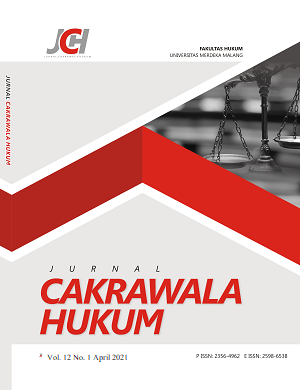Kajian yuridis tentang merek terkenal dan upaya hukum terhadap pelanggarannya
DOI:
https://doi.org/10.26905/idjch.v12i1.5723Keywords:
Brand, Legal Effort, Offense.Abstract
International trademark regulation is based on the Paris Convention and The Agreement on Trade-Related Aspects of Intellectual Property Rights (TRIPS) while in Indonesia the regulation regarding trademark has undergone several changes, most recently Law Number 20 of 2016 concerning Trademarks and Geographical Indication. A trademark can be said to be a well-known trademark if it meets the criteria for a well-known trademark, but the latest Indonesia trademark law does not clearly explain the criteria for it. This study uses a normative juridical approach. This approach focuses on examining literature materials such as legislation and other relevant sources. This study examines the criteria for a well-known trademark by making comparisons between existing laws in Indonesia and countries and examines what legal remedies can be taken if a violation occurs. The results of this study indicate that there are several criteria for a well-known trademark that can be applied in Indonesia from the regulations of other countries to provide legal certainty. Some of these criteria are records of successful use of marks, trademarks that have been registered in various countries and those that are not yet in the Indonesian legal system, namely special registration of a well-known trademark. For legal measures against infringement of the well-known trademark, it can be done in court (litigation) or outside the court (non-litigation) such as dispute resolution through arbitration.
How to cite item: Aldison, K. D. Sunarjo., Djaja, Hendra. (2021). Kajian yuridis tentang merek terkenal dan upaya hukum terhadap pelanggarannya. Jurnal Cakrawala Hukum, 12(1), 41-50.doi:10.26905/idjch.v12i1.5723.
Downloads
References
Amrulla, M.F., 2018. Urgensi pengaturan tentang peralihan hak atas merek sebagai objek jaminan fidusia. Jurnal Cakrawala Hukum, 9(2), pp.135-141.
Djaja, H., 2013. Perlindungan Indikasi Geografis Pada Produk Lokal Dalam Sistem Perdagangan Internasional. Jurnal Cakrawala Hukum, 18(2).
Harahap, M. Yahya. 1997. Tinjauan Merek Secara Umum dan Hukum Merek di Indonesia Berdasarkan Undang- Undang Nomor 19 Tahun 1992. Citra Aditya. Bandung.
Kusuma, Ida Ayu Sri Dewi, & Sugama, I Dewa Gede Dana. 2020. Upaya arbitrase dalam penyelesaian sengketa Merek terkenal. Vol. 9, No. 3.
Marpaung, Leden. 1995. Tindak pidana terhadap hak atas kekayaan intelektual. Sinar Grafika. Jakarta.
Miladiyanto, S. and Ariyanti, A., 2020. Perinsip moralitas merek dalam undang-undang nomor 20 tahun 2016 tentang Merek dan Indikasi Geografis. Jurnal Cakrawala Hukum, 11(3).
Office of Controller General Patent, Design, Trade Mark, Department for Promotion of Industry and Inter- nal Trade Ministry of Commerce & Industry, Gov- ernment India. 1999. The Trade Marks Act 1999. Government India. India.
Salam, Moch. Faisal. 2007. Penyelesaian sengketa bisnis secara nasional dan internasional. Mandar Maju. Bandung.
Singapore Statutes Online. Trade Marks Act 2005. diakses dari https://sso.agc.gov.sg/Act/TMA1998. diakses tanggal 9 November 2020.
Sulastri, dkk. 2018. Perlindungan hukum terhadap merek (tinjauan terhadap merek dagang Tupperware versus Tulipware. Jurnal Yuridis, Vol.5, No.1, Juni.
Tim Detik News, Bukan cuma superman, merek-merek top dunia ini juga keok di Indonesia (Online). diakses dari https://news.detik.com/berita/d-4569146/ bukan-cuma-superman-merek-merek-top-dunia- ini-juga-keok-di-indonesia. diakses pada tanggal 30 Maret 2020.
Usman, Rachmadi. 2013. Pilihan penyelesaian sengketa di luar pengadilan. Citra Aditya Bakti. Bandung.
Web Crunchbase. 2020. DC. Comics. diakses dari: https://www.crunchbase.com/organization/dc- comics#section-overview, diakses pada tanggal 30 Maret 2020.
Wignjosoebroto, Soetandyo. 2002. Hukum: paradigma, metode, dan dinamika masalahnya. Elsem. Jakarta.
Winarta, Frans Hendra. 2016. Hukum Penyelesaian Sengketa Arbitrase Nasional Indonesia dan Internasional. Sinar Grafika Offset. Jakarta.
World Intellectual Property Organization (WIPO). 1999. Joint Recommendation Concerning Provisions on the Protection of Well-Known Marks. World Intellectual Property Organization, Paris.
Additional Files
Published
How to Cite
Issue
Section
License
Copyright (c) 2021 Jurnal Cakrawala Hukum

This work is licensed under a Creative Commons Attribution-ShareAlike 4.0 International License.
Authors who publish in this journal agree to the following terms:
The copyright of the received article shall be assigned to the journal as the publisher of the journal. The intended copyright includes the right to publish the article in various forms (including reprints). The journal maintains the publishing rights to the published articles. Authors must agree to the copyright transfer agreement by checking the Copyright Notice column at the initial stage when submitting the article.









